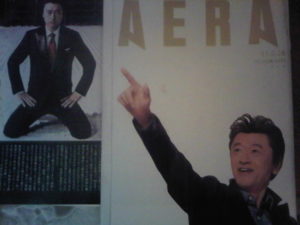A legendary Japanese pop singer will stay at the top not as the king but as a servant of the God of music
The King went into hospital in 2010. He was diagnosed with esophageal cancer last July. After he left hospital, he looks to have changed internally.
The King is Keisuke Kuwata. He is one of the most popular Japanese pop singers in the country. With songs associated with summer, the sea, romance, he has been loved by many Japanese people for decades. Although they have been taking an indefinite break since 2008, his successful band, Southern All Stars, are seen as Japan’s national music group. Their hit songs include Itoshino-Ellie (Ellie My Love), Manatsuno-Kajitu (A Fruit of Midsummer) and Tsunami.
Despite his remarkable success, he was thinking that he was missing something important for the last few years. So he decided to get back to the way he used to enjoy playing music.
In doing so, he wants to rediscover the joy of music. “The reason why I played music in the past was simple: I like the Beatles or Leon Russel”, he told to AERA, a weekly magazine of Asahi Shimbun[*]. While his band continued to create lots of hit songs, he became a craftsman creating such songs too much to keep the joy of music in his mind: as a result, he found himself being “too good at gaining people’s favour”.
Such soul-searching is not unique. Bob Dylan, a legendary American folk singer and an icon, seems to keep ecstasy of music all the time. But he is doing so in a slightly different way from Mr Kuwata does: as Tim de Lisle, a journalist, points out in Intelligent Life Magazine[†], “he has spent a lifetime defying expectations….Inside the old man, a sullen teenager is still trying to get out”. In other words, both musicians are forever young.
With youthful and energetic spirits, they show keen interest in society. The Japanese singer returned to work after cancer treatment with new songs. One of which, Imagine All the People, is critical about the way the government runs the country and pension system. Not to mention, Dylan’s songs such as Blowin’ in the Wind, were protest songs, and he was involved in the US civil rights and anti-war movements in the 1960s. But while Mr Kuwata begins to emphasise our time rather than love songs these days, Mr Dylan stopped singing his influential songs in the late 1960s because he was fed up with the image people had of him. Worse, Mr Dylan took drugs.
It is clear that being in hospital was a turning point for Mr Kuwata. Cancer fears haunted him; this sadness and loneliness are expressed in his song called Mr Moonlight, which has a soulful melody and lyrics. Mr Dylan, too, survived a serious motorcycle accident in 1966, which provided him with a chance to retire from the music world for a while. But, unlike Mr Dylan, Mr Kuwata found that his desire for music became stronger than ever before: now he thinks that playing music makes him believe that he can overcome the disease.
With the passion for music growing ever stronger, he released his fourth solo album “Musicman” this February. The driving force was “to pursue the joy of music as a singer”, he says to WOWOW, a pay-TV broadcaster[‡]. The title of the album means a mysterious creature of the universe, which suggests that when he spent months in hospital, he may have found his mission or meaningful work. After all, it seems that the disease transformed the King of Pop: he now serves for the God of music. If that is odd, put it this way: a young man just grew up. That still sounds cool.■
memo
[*] Asahi Shimbun weekly AERA, a big interview with Keisuke Kuwata, February 28th 2011
[†] Tim de Lisle, Bob Dylan’s Curious Dotage, Intelligent Life Magazine, Spring 2011
[‡] WOWOW monthly programme guide, March 2011

Ryo Kubota is a staff writer at Transpheric Management in Tokyo as well as a freelance writer. He has covered Sports for the Nippon Newspaper Company in Tokyo and teaches at a private tutoring school in Iruma, Japan. Having studied in both Tokyo and England in the areas of sociology, he has a keen interest in the world at large.









